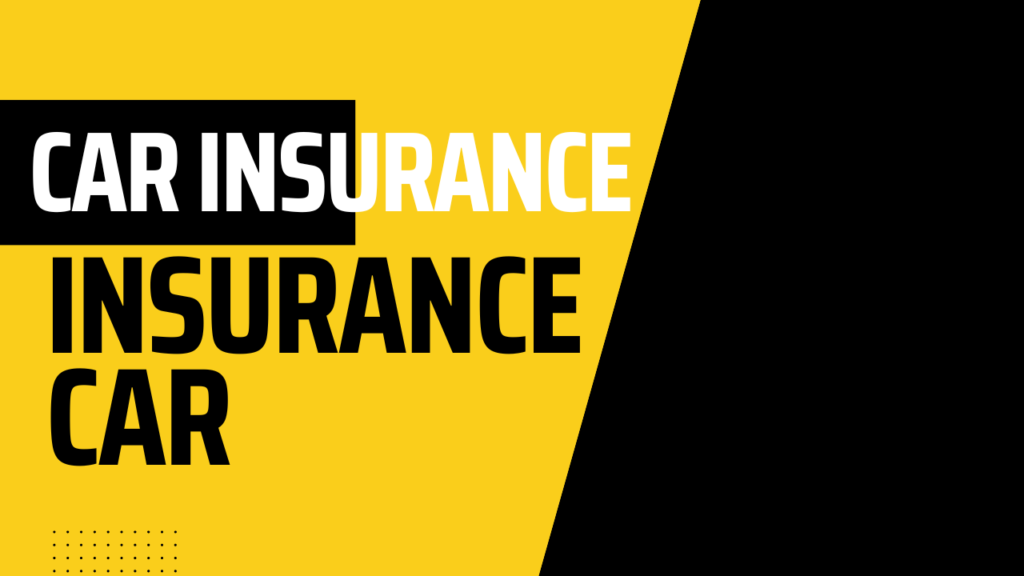Essential Insurance You Need To Have: Protecting Your Future and Finances
Introduction
In the fast-paced and unpredictable world we live in, safeguarding our future and finances has become more critical than ever before. One of the most effective ways to achieve this is through insurance coverage. While there are various types of insurance available, certain policies are essential for every American to have. In this article, we will delve into the key insurance types you need to consider to protect yourself and your loved ones in the American context.
1.Health Insurance: Ensuring Access to Quality Healthcare
Health insurance is a critical component of safeguarding your well-being and financial security in the American context. With the complex and often expensive healthcare system in the United States, having health insurance is more important than ever before. It ensures that you and your family have access to quality medical care when you need it the most.
Comprehensive Coverage for Medical Services
Health insurance provides coverage for a wide range of medical services, including hospitalizations, doctor visits, surgeries, laboratory tests, and prescription medications. It ensures that you can seek medical attention without worrying about the steep costs associated with healthcare services. Without insurance, a single medical emergency or chronic illness could lead to substantial medical bills that could be financially devastating.
Preventive Care and Wellness Programs
Many health insurance plans also emphasize preventive care and wellness programs. These services focus on maintaining good health, detecting potential health issues early on, and promoting healthy lifestyle choices. Preventive care can include routine check-ups, vaccinations, screenings, and counseling to help you stay healthy and prevent serious illnesses.
Protection Against Catastrophic Medical Expenses
One of the primary benefits of health insurance is protection against catastrophic medical expenses. In the unfortunate event of a severe illness or accident, the costs of hospitalization, surgeries, and ongoing treatments can quickly escalate. With health insurance, your out-of-pocket expenses are limited, and the insurance company bears a significant portion of the financial burden.
Network of Healthcare Providers
Most health insurance plans have a network of healthcare providers with whom they have negotiated discounted rates. When you choose a provider within the network, you can take advantage of these lower rates, reducing your overall healthcare costs. Additionally, having a network of providers ensures that you have access to a wide range of medical specialists and facilities, ensuring comprehensive care when needed.
Legal Requirements and Tax Benefits
Health insurance has also become a legal requirement in the United States under the Affordable Care Act (ACA). The ACA mandates that all Americans have minimum essential coverage, either through an employer, government program, or individual market. Failing to have adequate health insurance can result in penalties during tax season.
Moreover, having health insurance can offer tax benefits. Contributions to certain types of health insurance plans, such as Health Savings Accounts (HSAs) or Flexible Spending Accounts (FSAs), are often tax-deductible, allowing you to save on taxes while saving for future medical expenses.
In conclusion, health insurance plays a vital role in ensuring access to quality healthcare and protecting your financial well-being in the American context. It offers comprehensive coverage for medical services, promotes preventive care and wellness, and shields you from catastrophic medical expenses. With the legal requirements and potential tax benefits, health insurance is not only a prudent financial decision but also a means to secure a healthier and more stable future for yourself and your loved ones.
2.Auto Insurance: Protecting Your Vehicle and Finances
Auto insurance is an indispensable coverage for any American who owns or operates a vehicle. In the United States, where millions of vehicles are on the roads daily, accidents and unexpected incidents are common. Having the right auto insurance policy can provide protection not only for your vehicle but also for your finances.
Liability Coverage for Third-Party Damages
One of the essential components of auto insurance is liability coverage. This coverage protects you from financial liabilities in case you cause an accident that results in property damage or injuries to others. Without liability coverage, you could be held personally responsible for the expenses related to the accident, which could be substantial. Auto insurance steps in to cover these costs up to your policy’s limits, saving you from potential bankruptcy or severe financial strain.
Comprehensive and Collision Coverage
In addition to liability coverage, comprehensive and collision coverage are crucial for safeguarding your vehicle. Collision coverage pays for the damages to your vehicle if you collide with another vehicle or object, regardless of fault. Meanwhile, comprehensive coverage protects your vehicle against damages from non-collision incidents, such as theft, vandalism, fire, falling objects, or natural disasters.
Both comprehensive and collision coverage can be especially beneficial for newer vehicles or vehicles with higher values. Repairing or replacing a damaged vehicle can be expensive, and auto insurance can significantly ease the financial burden associated with such incidents.
Uninsured and Underinsured Motorist Coverage
Unfortunately, not all drivers on the road carry sufficient auto insurance. In the event of an accident with an uninsured or underinsured driver, you may face difficulties in recovering your damages. Uninsured and underinsured motorist coverage steps in to protect you in such situations, covering your medical expenses and property damages when the at-fault driver lacks sufficient insurance or is uninsured altogether.
Medical Payments Coverage
Medical payments coverage, also known as MedPay, is an additional feature that can be added to your auto insurance policy. MedPay covers medical expenses for you and your passengers, regardless of who is at fault in an accident. It can be especially valuable if you do not have health insurance or if your health insurance has high deductibles and copayments.
Legal Protection and Rental Car Reimbursement
Some auto insurance policies also include legal protection, which covers legal expenses if you are involved in a lawsuit related to an auto accident. Additionally, rental car reimbursement coverage provides funds to rent a replacement vehicle while your car is being repaired due to a covered event.
In conclusion, auto insurance is a crucial investment for protecting your vehicle and finances in the American context. It offers liability coverage to shield you from financial liabilities resulting from accidents, as well as comprehensive and collision coverage to cover damages to your vehicle. Uninsured and underinsured motorist coverage ensures protection even when other drivers lack sufficient insurance, while medical payments coverage helps with medical expenses. Legal protection and rental car reimbursement are additional benefits that provide peace of mind during challenging times. By having adequate auto insurance, you can navigate the roads with confidence, knowing that you are financially protected in case of any unexpected events on the road.
3.Homeowners or Renters Insurance: Safeguarding Your Dwelling
Whether you own a home or rent a property, having the right insurance coverage is essential to safeguard your dwelling and personal belongings. Homeowners insurance and renters insurance offer protection and peace of mind in the event of unexpected disasters or accidents.
Homeowners Insurance for Property Owners
For homeowners, their property is often their most significant investment, and homeowners insurance helps protect it from various perils. This insurance typically covers the physical structure of the home, including the walls, roof, floors, and built-in appliances, in case of damages caused by covered events such as fire, windstorms, hail, or vandalism.
Additionally, homeowners insurance also provides coverage for detached structures on the property, such as garages, sheds, or fences. It also extends to personal belongings within the home, such as furniture, clothing, and electronics. In case of theft or damage due to covered incidents, homeowners can receive compensation for the value of their possessions up to certain limits.
Liability protection is another crucial component of homeowners insurance. If someone gets injured on your property and sues you for damages, this coverage can help cover legal expenses and medical bills, protecting you from potential financial ruin.
Renters Insurance for Tenants
For those who rent their homes or apartments, renters insurance is equally important. While landlords usually have insurance for the structure of the building, their insurance does not cover the personal belongings of the tenants. Renters insurance bridges this gap, offering protection for the tenant’s possessions in case of theft, fire, or other covered events.
Moreover, renters insurance also provides liability coverage. If a guest is injured while visiting your rented property and holds you responsible, renters insurance can help cover medical expenses and legal fees associated with the lawsuit.
Additional Living Expenses (ALE) Coverage
Both homeowners and renters insurance policies often include Additional Living Expenses (ALE) coverage. ALE coverage helps with living expenses if your home or rental property becomes temporarily uninhabitable due to a covered event. It can cover costs like hotel stays, meals, and transportation until you can return to your home or find a new place to live.
Understanding Coverage Limits and Deductibles
It’s essential to understand the coverage limits and deductibles of your homeowners or renters insurance policy. Coverage limits refer to the maximum amount an insurer will pay for a covered loss. Ensure that your coverage limits are sufficient to protect your property and belongings adequately.
Deductibles are the out-of-pocket amount you must pay before your insurance coverage kicks in. Higher deductibles usually result in lower insurance premiums, but be sure to choose a deductible that you can comfortably afford in the event of a claim.
In conclusion, homeowners insurance and renters insurance are crucial for safeguarding your dwelling and personal belongings. Homeowners insurance offers comprehensive protection for property owners, covering the structure, personal belongings, and liability. Renters insurance is equally important for tenants, providing coverage for personal belongings and liability as well. Additionally, both types of insurance often include coverage for Additional Living Expenses, which can be a lifeline in the face of unforeseen events that render your property uninhabitable. By investing in these insurance policies, you can have the peace of mind knowing that you and your possessions are protected, regardless of the unforeseen challenges that may arise.
4.Life Insurance: Ensuring Financial Stability for Your Loved Ones
Life insurance is a crucial financial tool that provides a safety net for your loved ones in the event of your untimely passing. It ensures that your family and dependents are financially protected and can maintain their standard of living even after you are no longer there to provide for them.
Types of Life Insurance
There are primarily two types of life insurance: term life insurance and permanent life insurance. Term life insurance provides coverage for a specific period, such as 10, 20, or 30 years. If you pass away during the policy term, the death benefit is paid to your beneficiaries. Term life insurance is often more affordable and straightforward, making it a popular choice for those seeking pure protection for a specific period, such as when they have young children or a mortgage.
Permanent life insurance, on the other hand, provides coverage for your entire life, as long as you continue to pay the premiums. It comes in various forms, including whole life insurance, universal life insurance, and variable life insurance. In addition to the death benefit, permanent life insurance also accumulates a cash value component that grows over time. This cash value can be accessed during your lifetime through withdrawals or policy loans, providing you with an added financial asset.
Protecting Your Family’s Financial Future
The primary purpose of life insurance is to protect your family’s financial future. The death benefit from a life insurance policy can be used to cover various expenses, such as funeral costs, outstanding debts, mortgage payments, and everyday living expenses. For families with young children, life insurance can also fund their education, ensuring that their aspirations are not hindered by financial constraints.
Life insurance is especially crucial for single-income households, where the loss of the breadwinner could lead to significant financial hardships. It provides peace of mind, knowing that your loved ones will be taken care of and can maintain their lifestyle in the face of life’s uncertainties.
Estate Planning and Wealth Transfer
Life insurance is also an essential tool for estate planning and wealth transfer. If you have significant assets that may be subject to estate taxes upon your passing, life insurance proceeds can be used to cover these taxes, ensuring that your heirs receive their inheritance without any financial burden.
Moreover, life insurance can be a valuable means to equalize an inheritance among multiple beneficiaries. For instance, if you plan to leave a business to one child, you can use life insurance to provide an equivalent inheritance to your other children who might not be involved in the business.
Business Continuity
Life insurance is not only valuable for individuals and families but also for business owners. Business owners can use life insurance to fund a buy-sell agreement, ensuring a smooth transition of the business in case of a partner’s death. It provides the surviving partners with the funds to buy out the deceased partner’s share from their heirs, preserving the business’s continuity.
In conclusion, life insurance plays a pivotal role in ensuring financial stability for your loved ones and protecting their future in the event of your passing. It provides a financial safety net to cover immediate expenses, outstanding debts, and future needs. Additionally, life insurance can serve as an essential component of estate planning and business continuity, offering a range of benefits beyond the basic death benefit. By investing in life insurance, you can take proactive steps to secure the financial well-being of your family and provide them with the support they need during challenging times.
5.Disability Insurance: Protecting Your Income and Livelihood
Disability insurance is a vital form of protection that ensures your income and livelihood are safeguarded in the event that you become disabled and are unable to work. Unlike other types of insurance that focus on covering expenses after an incident, disability insurance specifically addresses the potential loss of income due to disability.
Understanding Disability Insurance
Disability insurance provides a portion of your income if you are unable to work due to a covered illness or injury. It acts as a financial safety net, offering you peace of mind knowing that you can still meet your financial obligations and maintain your standard of living even if you can no longer work.
Short-Term vs. Long-Term Disability Insurance
There are two main types of disability insurance: short-term disability and long-term disability.
Short-term disability insurance typically covers a portion of your income for a short duration, usually a few weeks to a few months, after a disability occurs. This type of coverage is useful for covering the initial period of a disability or recovery from a minor injury or illness.
Long-term disability insurance, on the other hand, provides coverage for an extended period, often several years or until the disability ends, or the insured reaches a certain age. Long-term disability insurance is designed to provide more comprehensive and long-lasting protection, especially for severe disabilities that may require an extended absence from work or a career change.
Protecting Your Income and Livelihood
Disability insurance is especially critical for individuals who rely heavily on their income to support themselves and their families. It acts as a safety net to cover essential expenses such as mortgage or rent, utility bills, groceries, and other living costs, ensuring that your financial obligations are met even when you are unable to work.
Furthermore, disability insurance can also help protect your long-term financial goals, such as saving for retirement or your children’s education. By providing a steady stream of income during a disability, you can continue to save and invest, mitigating the potential impact on your financial future.
Group vs. Individual Disability Insurance
Disability insurance can be obtained through group plans offered by employers or through individual policies. Employer-sponsored group plans are often more accessible and may be offered at a lower cost. However, they may have limitations on coverage levels and might not be portable if you change jobs.
Individual disability insurance policies, though typically more expensive, offer greater customization and flexibility. You have more control over the coverage amount, elimination periods (waiting periods before benefits kick in), and the definition of disability, which can be crucial in ensuring you are adequately protected based on your specific occupation and needs.
In conclusion, disability insurance is a crucial component of financial planning, protecting your income and livelihood in the event of a disability. It offers financial security by replacing a portion of your income when you cannot work due to a covered illness or injury. With short-term and long-term options available, disability insurance provides comprehensive protection for various disability scenarios. Whether obtained through an employer or an individual policy, disability insurance is a vital investment that ensures you and your loved ones are financially protected during challenging times, allowing you to focus on recovery and maintaining your quality of life.
Conclusion
In conclusion, insurance is a vital component of financial planning, offering protection and security for both your future and finances. In the American context, health insurance, auto insurance, homeowners or renters insurance, life insurance, and disability insurance are among the essential types you should consider having. Each insurance policy serves a specific purpose and helps mitigate potential risks and financial burdens associated with unexpected events. By investing in these essential insurance coverages, you can face life’s uncertainties with confidence and ensure a more secure and prosperous future for you and your loved ones.
Essential Insurance You Need To Have, Essential Insurance You Need To Have, Essential Insurance You Need To Have, Essential Insurance You Need To Have, Essential Insurance You Need To Have, Essential Insurance You Need To Have
Essential Insurance You Need To Have, Essential Insurance You Need To Have, Essential Insurance You Need To Have, Essential Insurance You Need To Have, Essential Insurance You Need To Have, Essential Insurance You Need To Have
Essential Insurance You Need To Have, Essential Insurance You Need To Have, Essential Insurance You Need To Have, Essential Insurance You Need To Have, Essential Insurance You Need To Have, Essential Insurance You Need To Have



